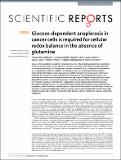| dc.contributor.author | Cetinbas, Naniye Mallı | |
| dc.contributor.author | Sudderth, Jessica | |
| dc.contributor.author | Harris, Robert C. | |
| dc.contributor.author | Negri, Gian L. | |
| dc.contributor.author | DeBerardinis, Ralph J. | |
| dc.contributor.author | Sorensen, Poul H. | |
| dc.contributor.author | Yilmaz, Omer | |
| dc.contributor.author | Cebeci Aydin, Aysun | |
| dc.date.accessioned | 2017-02-14T18:50:53Z | |
| dc.date.available | 2017-02-14T18:50:53Z | |
| dc.date.issued | 2016-09 | |
| dc.date.submitted | 2016-02 | |
| dc.identifier.issn | 2045-2322 | |
| dc.identifier.uri | http://hdl.handle.net/1721.1/106924 | |
| dc.description.abstract | Cancer cells have altered metabolism compared to normal cells, including dependence on glutamine (GLN) for survival, known as GLN addiction. However, some cancer cell lines do not require GLN for survival and the basis for this discrepancy is not well understood. GLN is a precursor for antioxidants such as glutathione (GSH) and NADPH, and GLN deprivation is therefore predicted to deplete antioxidants and increase reactive oxygen species (ROS). Using diverse human cancer cell lines we show that this occurs only in cells that rely on GLN for survival. Thus, the preference for GLN as a dominant antioxidant source defines GLN addiction. We show that despite increased glucose uptake, GLN addicted cells do not metabolize glucose via the TCA cycle when GLN is depleted, as revealed by [superscript 13]C-glucose labeling. In contrast, GLN independent cells can compensate by diverting glucose-derived pyruvate into the TCA cycle. GLN addicted cells exhibit reduced PDH activity, increased PDK1 expression, and PDK inhibition partially rescues GLN starvation-induced ROS and cell death. Finally, we show that combining GLN starvation with pro-oxidants selectively kills GLN addicted cells. These data highlight a major role for GLN in maintaining redox balance in cancer cells that lack glucose-dependent anaplerosis. | en_US |
| dc.description.sponsorship | National Institutes of Health (U.S.) (Grant R00 AG045144) | en_US |
| dc.description.sponsorship | Scientific and Technological Research Council of Turkey (Programme 2219) | en_US |
| dc.language.iso | en_US | |
| dc.publisher | Nature Publishing Group | en_US |
| dc.relation.isversionof | http://dx.doi.org/10.1038/srep32606 | en_US |
| dc.rights | Creative Commons Attribution 4.0 International License | en_US |
| dc.rights.uri | http://creativecommons.org/licenses/by/4.0/ | en_US |
| dc.source | Nature | en_US |
| dc.title | Glucose-dependent anaplerosis in cancer cells is required for cellular redox balance in the absence of glutamine | en_US |
| dc.type | Article | en_US |
| dc.identifier.citation | Cetinbas, Naniye Mallı et al. “Glucose-Dependent Anaplerosis in Cancer Cells Is Required for Cellular Redox Balance in the Absence of Glutamine.” Scientific Reports 6 (2016): 32606. | en_US |
| dc.contributor.department | Massachusetts Institute of Technology. Department of Biology | en_US |
| dc.contributor.department | Koch Institute for Integrative Cancer Research at MIT | en_US |
| dc.contributor.mitauthor | Yilmaz, Omer | |
| dc.contributor.mitauthor | Cebeci Aydin, Aysun | |
| dc.relation.journal | Scientific Reports | en_US |
| dc.eprint.version | Final published version | en_US |
| dc.type.uri | http://purl.org/eprint/type/JournalArticle | en_US |
| eprint.status | http://purl.org/eprint/status/PeerReviewed | en_US |
| dspace.orderedauthors | Cetinbas, Naniye Mallı; Sudderth, Jessica; Harris, Robert C.; Cebeci, Aysun; Negri, Gian L.; Yılmaz, Ömer H.; DeBerardinis, Ralph J.; Sorensen, Poul H. | en_US |
| dspace.embargo.terms | N | en_US |
| dc.identifier.orcid | https://orcid.org/0000-0002-7577-4612 | |
| mit.license | PUBLISHER_CC | en_US |
| mit.metadata.status | Complete | |
